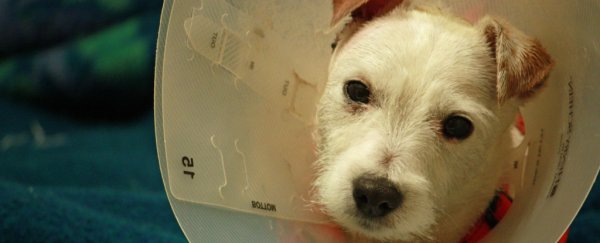Scientists in the US have developed a single injection that offers long-term contraception to both male and female animals.
The treatment has only been tested in mice so far, but in the future it could replace the need to spay and neuter your pets - and could also make it a lot easier and more humane to manage feral animal populations.
The treatment uses a small, harmless virus known as an adeno-associated virus (AAV), which can deliver sequences of DNA to muscle cells.
In this case, the researchers used AAV to deliver a gene that caused the mouse muscle cells to produce an antibody that's known to neutralise gonadotropin-releasing hormone (GnRH).
GnRH is referred to by scientists as a "master regulator of reproduction" in vertebrates, and it's a pretty big deal because it stimulates the hormones that go on to promote the formation of eggs, sperm, and sex steroids. Without GnRH, animals are infertile.
In the past, scientists have tried to vaccinate against GnRH, but the resulting infertility was short-lived, so it didn't work as a sustainable contraceptive.
Now a team from the California Institute of Technology (Caltech) in the US has shown that using AAV to stimulate GnRH antibodies can work for a longer period of time in mice, at least. The injection caused infertility in around two months, and most of the mice remained infertile for the rest of their lives.
"Inhibiting GnRH is an ideal way to inhibit fertility and behaviours caused by sex steroids, such as aggression and territoriality," said lead researcher Bruce Hay.
They're calling the new approach 'vectored contraception', and they believe that the DNA sequence could be altered to block other important sex hormones. They've already shown that the same technique can be used to produce an antibody that targets a binding site for sperm on the egg.
"This target is ideal when you want to inhibit fertility but want to leave the individual otherwise completely normal in terms of reproductive behaviours and hormonal cycling," said Hay.
There's more testing to be done to see whether the same technique works in other mammals, such as cats and dogs, but the goal is to create a one-off injection that can cheaply and quickly render animals infertile for a long period of time.
Such a contraceptive would be handy for pet owners, but would also help to more humanely reduce feral animal populations, such as cats. Right now, these animals are left to breed out of control, and are then controlled by being trapped and euthanised.
"Spaying and neutering of animals to control fertility, unwanted behaviour, and population numbers of feral animals is costly and time consuming, and therefore often doesn't happen," said Hay. "There is a strong desire in many parts of the world for quick, nonsurgical approaches to inhibiting fertility. We think vectored contraception provides such an approach."
The research has been published in Current Biology, and the team is now partnering with the Cincinnati Zoo to trial the injection in female domestic cats.
